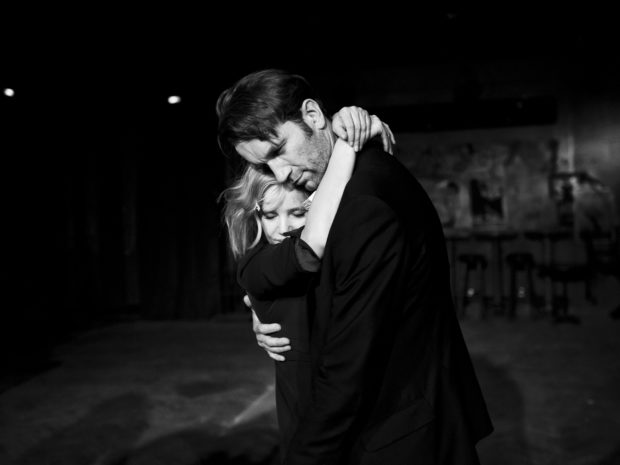In ‘Cold War’, a love exiled by communism — a review

This image released by Amazon Studios shows Joanna Kulig, left, and Tomasz Kot in a scene from “Cold War”. Image: Amazon Studios via AP
It took “Aquaman” two and a half hours just to put a fancy trident in its hero’s hands. Pawel Pawlikowski’s latest, “Cold War”, follows a doomed romance over 15 years and across much of mid-century Europe in a mere 88 minutes. And you’re telling me the guy who can swim fast is the superhero?
In two immaculate films in a row, Pawlikowski has put countless filmmakers to shame with his devastating concision. In his Oscar-winning and surprise arthouse smash “Ida” and now in “Cold War”, Pawlikowski distills staggering amounts of story into austere monochrome images so deeply expressive you could dive into them.
“Cold War” is a kind of companion piece to “Ida”. It’s similarly set in post-war Poland, shot in pristine black-and-white by cinematographer Lukasz Zal, framed in a boxy academy ratio and has jazz music drifting evocatively through it. But “Cold War” begins with a folk song, sung directly into the camera by a pair of peasants, whose plaintive tune foreshadows the heartbreak to come. “Open up my love, for fear of God,” they sing.
Pianist Wiktor Warski (Tomasz Kot) is traversing the bleak winter countryside of Poland in 1949 to record folk music and hold auditions for a new school of traditional song and dance. During tryouts, one student stands out to Wiktor: a striking, sultry blonde named Zuzanna, or Zula (Joanna Kulig). She doesn’t sing as well as some of the others but she catches the eye of the immediately infatuated Wiktor. The school’s other director dryly notes Zula isn’t the mountain girl she pretends to be, plus she’s on parole for killing her father.
“He mistook me for my mother so I used a knife to show him the difference,” Zula later explains.
Article continues after this advertisementWiktor promptly, inevitably falls for her and Zula isn’t far behind. At first, the perilous air of a femme fatale hangs over her. While they lie in a field, she pledges her fidelity to Wiktor even while confessing that she’s reporting on him to their communist supervisors.
Article continues after this advertisementWith Zula front and center, the show is a hit, a success the state quickly co-opts for propagandist means. Soon, they are singing communist anthems with an enormous curtain of Stalin draped behind them. While on tour, Wiktor and Zula resolve to flee to West Berlin, but Zula stands him up. It will be years before they reunite in Paris.
In Pawlikowski’s film, it’s often what happens in between the cuts that hurts the most. Just as crucial moments rob Zula and Wiktor of years together, time simply gets edited out. When they do finally make a life for themselves in Paris, it’s warped by the emptiness of exile. They live in a bohemian loft. Wiktor plays in jazz clubs. They make a record of Zula but she curses the French translations of the songs they sang in Poland. A relationship always tumultuous turns tragic without a country. “In Poland you were a man,” she sneers.
“Cold War” is dedicated to Pawlikowski’s parents, whom the protagonists are loosely based upon. Whereas the year’s other stunning black-and-white excavation of family past — Alfonso Cuaron’s “Roma” — is based on Cuaron’s own memories, Pawlikowski’s film is less a literal recreation. It’s more mythically drawn, and seen with a weary, backward-looking resignation.
It’s also animated by the filmmaker’s own political struggles in Poland, where “Ida” was made a campaign talking point by a nationalist right-wing party that, once in office, drew international criticism for its own ideological management of Polish heritage.
“Cold War” concludes with a forced finality that feels like the film’s only stray step. Kot and Kulig have by then forged such an indelible romance that we’ve come to believe in its persistence. (Kulig, in particular, is astonishing. It seems hardly possible that she covers so much emotional territory. This is the revelation of a retro-styled star of the highest magnitude.)
It’s Pawlikowski second-straight masterwork, only one with a critical if seldom-seen error. His movie is too short.
“Cold War”, an Amazon Studios release, is rated R for some sexual content, nudity and language. Running time: 88 minutes. Three and a half stars out of four. CC
RELATED STORIES:
‘The Marvelous Mrs. Maisel’ renewed for third season